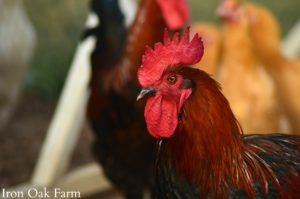 So you’ve decided on a breed that you just can’t live without and you’ve found a breeder. Sometimes poultry breeds can be so rare that you may only have one choice when it comes to buying stock, so depending on how badly you want that breed, you may have to just accept the buyer’s terms. However, there are still some things you should know before adding any birds to your flock.
So you’ve decided on a breed that you just can’t live without and you’ve found a breeder. Sometimes poultry breeds can be so rare that you may only have one choice when it comes to buying stock, so depending on how badly you want that breed, you may have to just accept the buyer’s terms. However, there are still some things you should know before adding any birds to your flock.
I’ve been on both sides of the breeding equation. I’ve been both the buyer and the seller, and I’ve had some…interesting encounters. I’ve had people tell me they only want female hatching eggs, and if they get a male they wanted to be able to return him with a full refund. (For those of you who are new to hatching, unfortunately, you can’t sex eggs.) I’ve had people all-but demand that I sell them my best birds, (a.k.a. pairs that I’ve set aside for breeding) and were outraged when I offered them offspring instead of the original pair. I’ve also hatched specific breeds for people, tied up my incubators for 3 weeks, only to have them lose interest and abandon the sale, demanding their deposit back.
I’ve also worked with difficult breeders, who act like they can behave however they like because they’re selling something you want.
Common courtesy goes a long way. Since we’re talking about buying in this post, if a breeder isn’t willing to be reasonably helpful and answer reasonable questions, then I would try to find someone else to work with.
There should also be an element of transparency with what they’re selling. You don’t need to know everything about how they run their farm, but they should be willing to answer a few questions and provide photos in online transactions.
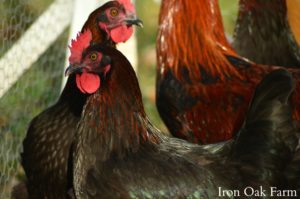
All negativity aside, I think you will find that chicken people can be some of the best people you’ll ever meet. I’ve made so many friends both online and in-person through chickens. Difficult people really are the rarity, but it’s something to be aware of.
In my last post, How to Find the Right Poultry Breeder, I talked about places where you can find breeders of rare, heritage breeds. In this post I’d like to offer some suggestions to make sure you know what you’re buying, and that you’ll be happy with these new additions to your flock.
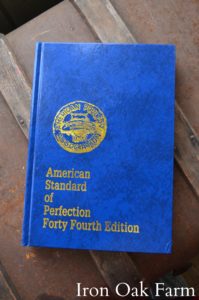 Learn the standard. As I said in my last post. Get a copy of the Poultry Standard of Perfection. Read about the breed. Research what it’s supposed to look like. If it’s not a recognized breed, then talk to some people who raise them. For example, French Black Copper Marans can come with both feathered legs (the traditional French variety) or an American strain without feathered legs. The French variety is more desirable especially if you are going to be showing birds.
Learn the standard. As I said in my last post. Get a copy of the Poultry Standard of Perfection. Read about the breed. Research what it’s supposed to look like. If it’s not a recognized breed, then talk to some people who raise them. For example, French Black Copper Marans can come with both feathered legs (the traditional French variety) or an American strain without feathered legs. The French variety is more desirable especially if you are going to be showing birds.
Where do the lines come from? What is the history of this particular strand? As you get into heritage breeds you will learn that there are certain names that are known in the breeding world. For example in the French Black Copper Maran world, you may find that many breeders are advertising that their birds come from Bev Davis or Wade Jeane lines. These two breeders are known for developing amazing examples of the breed.
Greenfire Farm is another great example of breeders offering amazing, rare birds. Greenfire is often the first importer of birds to the United States from all over the world.
How long have they been breeding that particular breed? Experience is really important when it comes to breeders. Have they been to shows with their own development in the line? Are they perpetuating desirable birds etc?
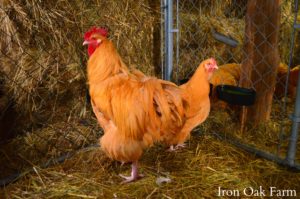 If you’re buying adult birds, ask if they’ve been proven fertile.
If you’re buying adult birds, ask if they’ve been proven fertile.
Certifications. Check the regulations for your state. All breeders should be certified in the National Poultry Improvement Plan (NPIP) if they are shipping birds. Some states require the Avian Influenza Certification as well. (For more on this, look for a future Homestead Hustle post).
Ask about their quarantine and biosecurity practices.
Ask for recent photos of the birds and egg color if that’s a factor.
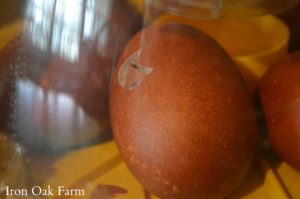 Hatch rate. Hatch rate applies to buying hatching eggs. They should be able to tell you what the rate of success has been from their past hatches. Hatch rate for hatching eggs should be around 80 percent or better. If they have a blog or Facebook page read through comments and reviews of the breeder.
Hatch rate. Hatch rate applies to buying hatching eggs. They should be able to tell you what the rate of success has been from their past hatches. Hatch rate for hatching eggs should be around 80 percent or better. If they have a blog or Facebook page read through comments and reviews of the breeder.
Shipping. Make sure you have a clear understanding of the shipping process. Often breeders will sell you a dozen hatching eggs but will include a couple extra in case a couple of eggs break. A dozen eggs usually will ship at a flat rate of $15 a box. If shipping is a lot more than that, I would ask what the extra charge is for. Live birds should be handled on an individual basis and can be discussed with your post office in advance.
Again, transparency is really important on the part of the breeder. Most of these questions should be offered on their website (if they have one).
Be patient, don’t settle, and be willing to pay a little extra for quality.












